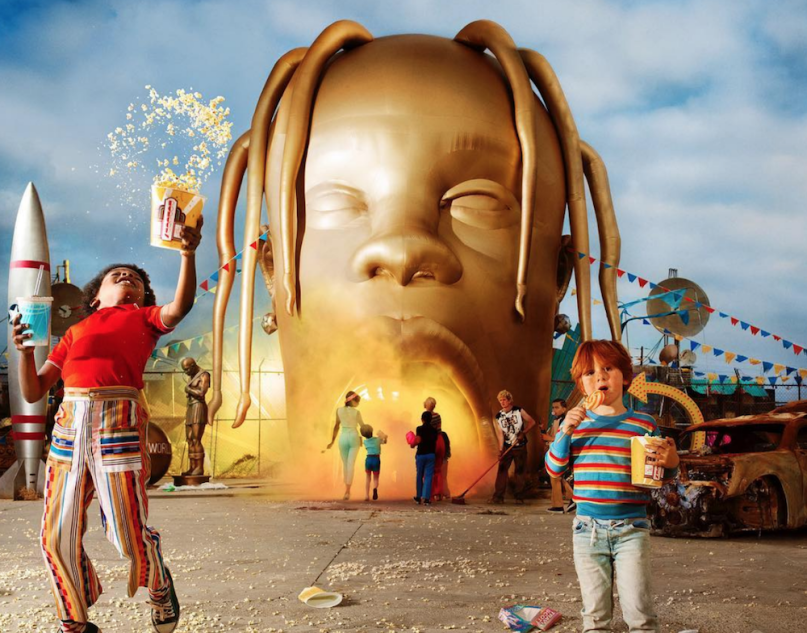Of the many Kanye West clones in music, Travis Scott is the most actualized. This is a feat he has accomplished by replicating Kanye’s penchant for vast collaboration in an effort to make the best record possible. This isn’t something Kanye invented, of course, so much as he promoted in a genre that has traditionally prided itself on the dual pairings of artist and producer. Like latter-day Kanye, Scott plucks ideas from both the mainstream and the fringes, workshopping them into something that displays tastemaking and curation, and, at its best, some musicianship, too.
This is how Scott has become an A-list rap star despite never really doing anything that original. He is a talented producer who made a name for himself through his association with West’s G.O.O.D. Music, which he followed up with dark and triumphant—though also extremely empty—production on his debut project, 2013’s Owl Pharaoh. He is also something of a visionary—he knows what’s popular or what will be popular, and he swallows that into his sound. Things like Houston hip-hop, Three 6 Mafia’s horror movie production, druggy cloud rap, and Kid Cudi’s spacey melodies are assembled like auto parts to build the ultimate car that can continue to propel Scott forward. Of course, all of those things have been regular elements in much of contemporary rap for awhile, but Scott renders everything bigger, making showmanship and his connections as much of an attraction as the music by itself. Cynical as that may be, it’s proven to be a successful method of creating a career.
However, the one thing Scott is not is a very good rapper. No real personality emerges from his words; often he’s just borrowing or shifting his style to match the more inventive rappers he works with, like Quavo or Young Thug. On 2016’s “Pick Up The Phone,” his best and biggest hit, Scott collaborates with both those two and is barely identifiable on his own song, mimicking their cadences when he is even audible at all.
Astroworld, Scott’s third studio album, is the closest he’s come to an admittance of the gambit. It is his most fully realized album, but also the one that most strikingly situates Scott as secondary to his collaborators. The run from opening track “Stargazing” to the James Blake and Stevie Wonder-featuring “Stop Trying To Be God” is the best version of a Travis Scott album: the beats sound gorgeously spacey and alive, switching and blurring so seamlessly that it’s hard to know what song is actually playing. Appearances from Frank Ocean, Drake, Swae Lee, and Gunna are utilized in mostly the best manner. In the case of “Stop Trying To Be God,” Scott meshes Kid Cudi’s deep-voiced humming, Wonder’s harmonica playing and Blake’s crooning like he’s conducting an orchestra, making for a great collaboration that reduces top-tier artists to tools at Scott’s disposal. It might be bothersome if it didn’t sound so gorgeous to the point that you don’t even need to pay attention to what Scott is saying on the record.
This is a common theme throughout Astroworld: how little Travis Scott actually means to his own music. He is not in the shadows—he is very much front and center—but everything around him is so much more interesting. On album standout “Sicko Mode,” listening to the beat switch up at two different moments is the emotional high point. Stellar production work from the trio of Hit-Boy, Tay Keith, and CuBeatz is combined with two Drake verses and the sprinkle of a Swae Lee melody to make an intensely electric, brash, and imaginative experience. It’s the best moment on the album, and that’s all without even acknowledging that Scott also raps on the record.
If anyone could use a 7-track project in the vein of G.O.O.D. Music’s recent releases, it’s Scott. For all the interesting things that can be found on Astroworld, it is still way too long and can sound so uniform that it loses your attention. Songs like “Skeletons” and “Cant Say” have good ideas or moments but don’t work as complete records on their own. They drone and repeat much of the same ideas and styles that already came before it. The mystique around Scott, which positions him as hip-hop’s great rock star and a future legend, is buoyed a bit by Astroworld, but what it ultimately shows is that even at his best the seams of this mythmaking are too visible. For all of Scott’s talent as a producer and his ability to live out a punk rock fantasy in concert, there is no real depth to his music and, while he can get away with it several times across an album, the facade eventually begins to crack.
However good an album can be sonically, it falls apart if there’s nothing else to carry it. Travis Scott’s inability to capture anyone’s attention due to his boilerplate lyricism about drugs and disaffected cool is tolerable at low doses, but after enough time all you can think about are the better rappers he’s clearly modeling himself after. In the case of another album standout,“Yosemite,” Scott literally raps exactly like a better rapper, Gunna, that is featured on the song with him.
When explaining the concept of Astroworld in a GQ magazine profile, Scott said that it was based on an old Six Flags theme park of the same name that once resided in Houston but was demolished in 2005. “That’s what it’s going to sound like, like taking an amusement park away from kids,” Scott says of the album. “It took the fun out of the city.” That’s evident somewhat in the nightmarish and explosive sound of the music, but it’s closer to resembling an amusement park being turned into a dystopian windowless drug den where Three 6 Mafia songs and Goodie Mob’s “Cell Therapy” are blasted through blown-out speakers. It might be an intense thrill occasionally, but enough time spent in this carousel of nightmares may actually destroy you. And for as much as Astroworld finds Scott making the best version one could ask of a Travis Scott album, there’s nothing here that supports Scott’s supposed importance.
Maybe that’s for the best. if there is a lesson anywhere on Astroworld, it’s there in the song title “Stop Trying To Be God”: the idol Scott has modeled so much of his career after will destroy himself to prove his place as an artistic deity, but Scott is fine just making music that people will eat up.





